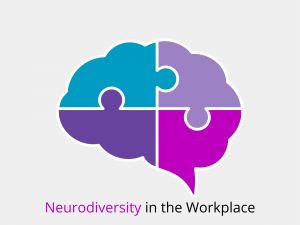What is Neurodiversity?
Although the expression that ‘everyone is different’ is used commonly but loosely, it is entirely true. Every single person’s brain is different and that is where neurodiversity becomes relevant. Neurodiversity is the concept that every human brain varies in neurocognitive abilities. Everyone has different talents and different struggles which is what makes us all individual. However, for some people these variations can be so profound that they become disabling. Some common examples of Neurodiverse conditions are ADHD, Dyspraxia, Autism and Dyslexia.
The human brain is as diverse as the human fingerprint – Victoria McGovern
How can this impact an employee?
Neurodiverse people tend to find some things particularly easy, whilst other things are incredibly hard. This can lead to inconsistent performance at work. It is crucial that neurodiverse individuals are in the right environment as their differences can be used as competitive advantages to achieve success instead of constantly trying to overcome their challenges. To achieve this, employers should create inclusive spaces to work and learn to reduce disabling factors and amplify diverse abilities by ensuring that their employees have roles that suit their specific needs.
How can employers help neurodiverse employees?
- Make appropriate adjustments to help amplify your employees’ strengths, whilst also maintaining privacy
- Make sure your employees have the right tools and environment to work in. This can be crucial to enhance their progression at work. However, it is important to take into account that these matters can be a difficult for employees to talk about, therefore keeping these matters private and confidential is imperative to keep your employees’ trust. Afterall, when a flower doesn’t bloom you fix the environment in which it grows, not the flower.
Examples of simple changes you can make to help your employees:
- Offer the opportunity for regular one-to-one conversations with supervisors or managers to ensure support is given as much as required.
- Discuss what visual prompts could help aid attentiveness. For example, a wall chart, checklists, clocks, or timers.
- Explore the best method for task instruction, this could be the difference between written or verbal.
- Provide time-management software to help them prioritize tasks and plan daily activities.
- Allow regular breaks or the opportunity for movement throughout the day.
- Allow the use of noise cancelling headphones to help block out any distractions.
Make neurodiversity a company-wide conversation
By consistently and openly supporting neurodiverse people, your employees will recognise that you are there to help and support them instead of potentially discriminating against them for not maintaining standards that may be impossible for them to reach. You will get so much more from your employees by recognising their strengths and challenges.
You might want to read about Autism in the workplace for some useful tips on creating a great working environment for autistic employees.
For advice or resources to help you recruit and retain the best talent contact us on [email protected] or call 0333 888 0290







